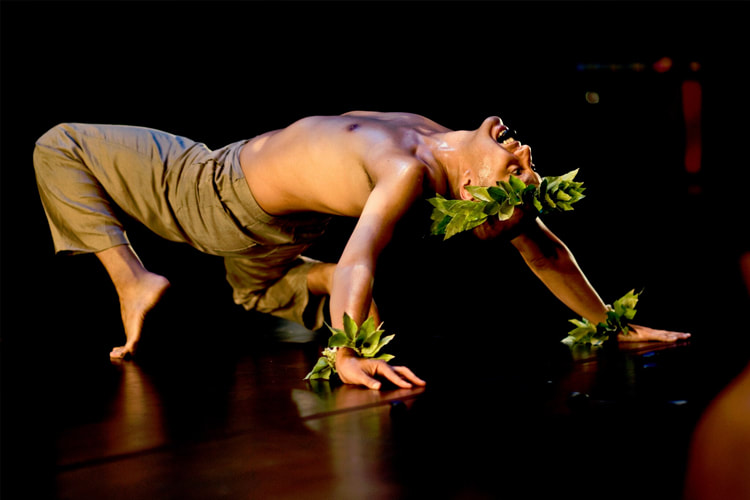|
Christopher K. Morgan performs his solo "Pohaku" at PS/21. “Pohaku,” a solo by Christopher K. Morgan, begins with the passing of rocks.
Audience members stand in the aisle, transporting stones hand-to-hand in a chain from the back of the theater to the stage. At its edge, Morgan kneels, accepting each piece of earth to build a solid stone shrine. And as his solo unfolds, one realizes what Morgan is really building is his fractured relationship with his Hawaiian culture – one pebble at a time. This deeply personal work, onstage at PS/21 in Chatham, blends stories, hula, modern dance with traditional and classical music to transport its audience to world of wind and water. Once on this a beautiful, isolated Pacific terrain, Morgan alerts us to a culture that has been trampled upon and nearly decimated. But with people like Morgan, whose parents were Hawaiian, but did not live on the islands, the songs, the stories and the dances are alive again. And more importantly, they are relevant. Morgan begins his solo as if a wave. He tumbles and tosses his frame back and forth across the stage. When he finally stands, he sways like a guava tree in the breeze. His nature imagery ripples into traditional hula dances – loose rolling hips topped off by arm and hand gestures that appear inviting to both the audience and unseen spirits. But he can also act aggressively, stomping his feet, moving his bend legs in and out like an accordion and jabbing the air with a stiff arm. And because the weather was cool, a steady stream of steam curled over his head – like a hot cup of tea brewing off of his crown. That alone gave audience a sense they were experiencing something special. Accompanying him are Elise Kaleihulukea Ryder performing traditional chants and percussion and Wytold, an electronic cellist – all sounds that draw the audience further into this exotic, distance landscape. The music quiets when Morgan speaks. He recalls the language of his childhood and the stories of his parents, particularly his mother who joined the military, trained in segregated Mississippi and became an electrical engineer. He also speaks of last island monarch Queen Lili’uokalani who was overthrown by wealthy U.S. landowners for control of the sugar industry. Throughout he sprinkles touches of the language and projections of both women and the Hawaiian scenery on screens of handmade paper. While the “Pohaku,” Hawaiian for stone, is infused with melancholy, a longing for a culture overrun. But at the same time, Morgan gives us hope. As he rebuilds his Hawaiian connection, he is also rebuilding the culture. One leaves “Pohaku” understanding its importance. And even though we only glimpse a sliver of Hawaiian songs, dance, stories and history, we too become carriers of the stones that will rebuild the island’s heritage. Sunday night is the last showing of “Pohaku” at PS/21 and the last showing of any performance under the tent. Next summer, the outdoor venue moves up the hill and inside into a permanent structure – complete with bathrooms, dressing rooms and rehearsal space. That has always been the plan. It took 12 years to get there, but the intrepid founder and President Judy Grunberg got it there. Congratulations PS/21.
0 Comments
Leave a Reply. |
Wendy
|

 RSS Feed
RSS Feed
